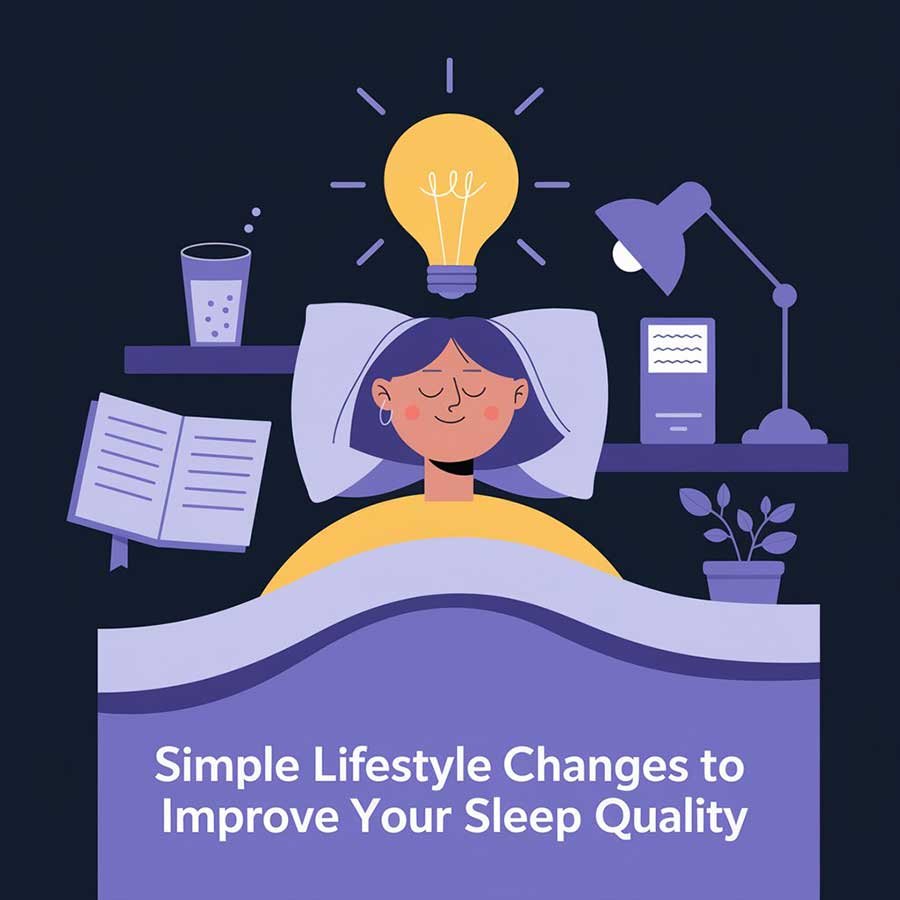
Simple Lifestyle Changes to Improve Your Sleep Quality
Getting a good night’s sleep is essential for overall health, yet many people struggle with sleep quality. The good news? Small lifestyle changes can make a big difference. By adjusting daily habits and creating a sleep-friendly environment, you can enjoy deeper, more restorative rest and wake up feeling refreshed and energized.

Why Sleep Quality Matters
Sleep affects nearly every aspect of life, from physical health to mental clarity and emotional well-being. Poor sleep quality can lead to:
- Increased stress and anxiety
- Reduced focus and productivity
- Weakened immune system
- Higher risk of chronic diseases like heart disease and diabetes
On the other hand, quality sleep enhances energy levels, mood stability, cognitive function, and overall well-being.
Lifestyle Changes to Improve Sleep Quality
1. Establish a Consistent Sleep Schedule
Your body thrives on routine. Going to bed and waking up at the same time every day (even on weekends) helps regulate your internal clock, making it easier to fall asleep and wake up naturally. Aim for 7-9 hours of sleep per night.
2. Create a Relaxing Bedtime Routine
A calming pre-sleep routine signals to your body that it’s time to unwind. Try:
- Reading a book (avoid screens)
- Taking a warm bath or shower
- Practicing deep breathing or meditation
- Writing in a gratitude journal
3. Optimize Your Sleep Environment
Your bedroom should be a sanctuary for sleep. Set it up for success by:
- Keeping the room cool (60-67°F or 15-19°C)
- Using blackout curtains to eliminate light
- Reducing noise with earplugs or a white noise machine
- Investing in a comfortable mattress and pillows
4. Limit Screen Time Before Bed
The blue light from phones, tablets, and TVs can suppress melatonin production, making it harder to fall asleep. Try turning off screens at least 30-60 minutes before bed and using blue-light-blocking glasses if necessary.
5. Be Mindful of What You Eat and Drink
What you consume during the day can impact your sleep. Consider:
- Avoiding caffeine and nicotine at least 6 hours before bedtime
- Limiting heavy or spicy meals before bed to prevent discomfort
- Choosing sleep-friendly snacks like bananas, almonds, or chamomile tea
6. Get Plenty of Natural Light During the Day
Exposure to natural sunlight helps regulate your circadian rhythm, making it easier to fall asleep at night. Aim for at least 30 minutes of sunlight exposure daily, preferably in the morning.
7. Exercise Regularly—But at the Right Time
Physical activity can improve sleep, but timing matters.
- Morning or afternoon exercise can promote better rest.
- Avoid vigorous workouts within 2-3 hours of bedtime to prevent overstimulation.
8. Manage Stress and Anxiety
Racing thoughts can keep you awake. Combat stress by:
- Practicing mindfulness or meditation
- Journaling before bed to clear your mind
- Engaging in relaxing activities like yoga or deep breathing exercises
9. Avoid Long or Irregular Naps
While short power naps (20-30 minutes) can be beneficial, long or late-afternoon naps can disrupt nighttime sleep. If you struggle with nighttime rest, try skipping naps altogether.
10. Reduce Alcohol and Late-Night Stimulants
While alcohol may make you feel drowsy, it disrupts sleep cycles, leading to poor-quality rest. Reduce alcohol consumption, especially close to bedtime, to improve sleep quality.
How Long Before You See Improvements?
Improving sleep quality doesn’t happen overnight. However, most people notice positive changes within 1-2 weeksof implementing better sleep habits. Consistency is key—stick to your new routine, and over time, falling and staying asleep will become easier.
Picture This
Imagine climbing into bed at night, knowing that restful sleep awaits. Your body feels relaxed, your mind is calm, and within minutes, you drift into deep, uninterrupted slumber. You wake up refreshed, full of energy, and ready to take on the day. No grogginess, no stress—just a well-rested version of you, every single morning. This is the power of prioritizing sleep quality.
What’s one small change you can make tonight to improve your sleep?
Please Share This Article
If this article helped you, please share it with others who struggle with sleep. A well-rested life is a healthier, happier life!






